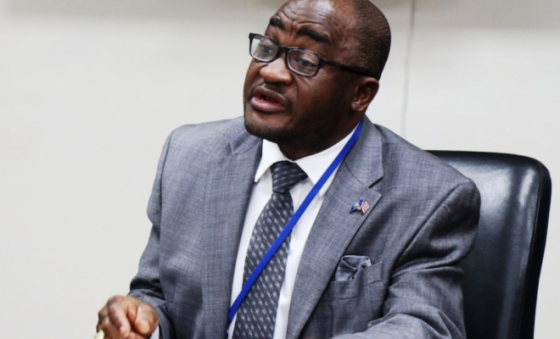Liberia: Cutting off the Nose to Spite the Face!

Foreign Minister-Kemayah.
– The case of Foreign Minister Dee Maxwell Kemayah
If Liberia’s Foreign Minister Dee Maxwell Kemayah had a sense of history, he would have known that his latest move to join 43 nations at the recent UN General Assembly, including Taiwan, in a vote to condemn what they called China’s repressive actions against Uighurs in its Xinjiang province is laden with implications for future China-Liberia relations.
Liberia and the Republic of Eswatini, formerly known as Swaziland, were the only two African countries that voted along with 41 others to condemn China.
The Chinese government has interpreted the vote as an attempt by Western countries to prevent its rise as a world superpower and for good reasons too.
For many years, China was referred to as the “sick man” of Asia and it ranked far behind the United States, Japan, Germany, Great Britain. etc, in terms of economic development.
It was in fact, at one time, a colony of Japan. Millions of its people were illiterate, hungry, and wallowed in extreme poverty when it triumphed over the Japanese in 1949 and gained independence in 1950. Sixty-one years later, China has turned the corner, pulled millions out of poverty, and is now ranked as the second-largest economy in the world next to the United States of America.
Its achievements in science and technology has placed it in pole position and now threatens the dominance of the United States as the global leader of science and technology and appears poised to overtake the United States as the world’s number one superpower.
But China has come under criticism from the West for its lending policies to developing countries. With such a large economy, it is not surprising that China has aggressively sought to secure sources of supply of minerals and other resources needed to fuel its huge economy.
In so doing, it has concluded agreements with several countries in the world, exchanging development assistance for access rights to mineral resources. Liberia is one of such countries, although the details of those exchange arrangements remain shrouded in secrecy.
Notwithstanding, China has provided Liberia very significant economic assistance, leaving a large footprint of its presence.
Given the above and despite all the hue and cry of those nations' alleged repression of Uighurs by the Chinese Government, there is an important lesson that we, African countries, could learn from China on how to combat jihadism, which is fast spreading southwards, to West Africa from North Africa and the Sahel.
That lesson is about fighting poverty and creating enabling conditions for the eradication of poverty, high and chronic unemployment, hunger and disease in West Africa. Most countries in West Africa are resource rich but poor and the question is why?
It is the failure of African governments, most of which are very corrupt, to address these issues that often induce a disconnect between the government and the people and creates fertile ground for the spread and acceptance of jihadist tendencies/doctrines as an appealing alternative.
Such was the case of Afghanistan, where the United States spent billions of dollars fighting radical Islamic insurgents and providing a mainstay to a very corrupt Afghan government and its officials. At the end of the day, the US abdicated, having suffered a disastrous defeat at the hands of the Taliban and leaving behind large amounts of military hardware worth billions of US dollars in their possession.
History recalls that it was the Tolbert Government that first recognized China’s sovereignty over Taiwan, which led to a break in diplomatic relations between Taiwan and Liberia.
Unlike China, the Taiwanese were engaged in dollar diplomacy, offering free cash to any country willing to recognize it as an independent nation. But such money was going into private pockets and the nation benefited little or nothing. Despite the generous economic assistance that China had provided Liberia, President Doe broke off relations with China in favor of Taiwan in exchange for cash.
But that was a fatal decision and mistake and when push did come to shove in 1990, at a time when Doe was in greatest need of China’s diplomatic support. At the UN, he failed to get it owing to his relations with Taiwan.
Similarly placed was Charles Taylor. When he most needed diplomatic support from the United Nations Security Council of which China is a permanent member, Taiwan was unable to step up to the plate.
Oxford Professor Dr. Neils Hahn in his book, US Covert and Overt Operations in Liberia, 1970s to 2003, writes:
“... As UN sanctions further weakened the GoL, Taylor realized that relations with Taiwan had serious consequences for the Liberian case in the UNSC. In 2002 he requested that Liberia’s representative to the UN in New York, Winston Tubman, start the process of establishing relations with the People’s Republic of China.
Taylor also instructed Brandy to organize a Liberian delegation to go to Beijing. However, Brandy recalls that Taylor stopped this process because Taiwan offered him US$5 to 10 million for maintaining relations with Taiwan, money that the GoL desperately needed for its defense budget.
Brandy and Tubman agree that this was Taylor’s most serious mistake and the major precipitating factor in his downfall.
“The People’s Republic of China was interested in relations with Liberia and could have provided evidence in the UNSC that Guinea and Sierra Leone supported LURD, thereby blocking extensions of UN sanctions on Liberia…”
In any case, it will be the suffering Liberian people who will bear the consequences of Minister Kemayah’s action. It is being said he did it to please the Americans as a true friend. But America does not have permanent friends, it has permanent interests instead. It is like cutting off the nose to spite the face.
